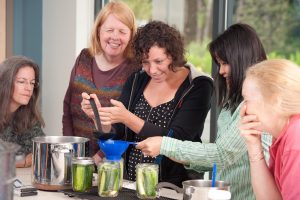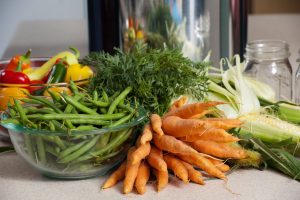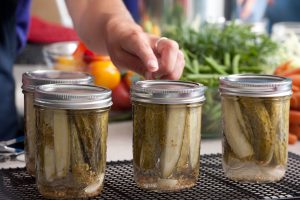
Q&A For the Novice Food Preserver
In this interview, Master Food Preserver Volunteer Kathy Shaw offers a Q&A for our readers about food preservation and in particular, the Master Food Preserver Volunteer Program (MFP) offered by the University of Maine Cooperative Extension. Kathy took the course in 2009. She has continued to be a part of the program ever since. She lives in Auburn where she runs Valley View Farm and farm store.
Q. Greetings Kathy! What food are you most looking forward to preserving this spring?
A. To continue with lots of fermented foods! Over the winter, we made different kinds of ferments. We made kombucha (which is fermented tea), fermented asparagus, green beans, cucumbers, and we are looking forward to trying fiddleheads this spring.
Q. How did you become interested in food preservation?
A. I grew up on a farm in Massachusetts where my great-grandmother preserved food. She fed our family out of our gardens. I tried it, haphazardly, as a kid. I appreciate it more now as an adult. It was a great opportunity to become a Master Food Preserver and to now be able to pass these skills on.
Q. Do you have a food preservation favorite?
A. I enjoy them all! It is very fascinating to me that you can take fresh food and preserve it in its natural state (with very few additives) and make it enjoyable for winter consumption. I do a lot of fruit leather too, with a dehydrator to make foods like banana chips and veggie chips. Food preservation is a way to take something that could potentially go bad and save it.
Q. Can you tell us what you learned about food safety in the program?
A. Make sure you pay attention to details. When preserving: make sure the food is all about the same age, with no rotten portions. Use very clean jars and non-reactive containers – especially with acids. Use the proper sealing procedure, and no chips on the glass jars. Make sure jars are canning approved. Down the road, if you’re not careful about your food preservation in all of its aspects, then you could make someone or yourself very sick.
Q. Can you tell us more about that?
A. One story I have is that I once had a very elderly farmer neighbor in his nineties. He had collected very large piles of bottles. I saw all these blue milk of magnesia bottles. I went to him and said look at these cool bottles! What are these about? He replied, “Oh this gal, she loved to cook, but she wasn’t very good at it!” [Meaning her cooking made everyone sick because she did not follow proper food safety.]
Q. What was the UMaine Extension’s Master Food Preserver program like?
A. A portion of class is dedicated to lecture and technique and the rest is hands-on. The instructors are very knowledgeable and it’s fun to get to know them. They’re all eager and easy to learn from. The program itself is excellent in methodology. The course is over a length of time so you will create friendships and partnerships in using skills. We worked in groups quite a bit so that was always a lot of fun for me; I learn better with a group. Group skills are important. Some of those contacts from ten years ago, I’ve kept even today.
Q. After becoming a MFP Volunteer, What kind of activities does a MFP get to do?
A. We commit to community service after the course in order to become a certified Master Food Preserver Volunteer. Each year, we maintain 20 hours of community service. I primarily offer a Q&A while I sell at my farmer’s market. People come to me with food preserving questions. One question may be, “What do I do with this full tray of over-ripe strawberries?” I’ll say, “You can slice them into chips and dust them with a little sugar, dehydrate them – then you’ll have strawberry chips!” I find that the UMaine Extension allows their volunteers fluidity that other comparable programs might not. For example, volunteers are often able to create their own projects.
Q. What are some other benefits to this program?
A. It gives folks confidence to try new things and opportunity to learn from mistakes. It’s a perfect way for folks to think about creating their own little business as well. The potential is there for small home-based businesses. I live in Auburn, which is a Food Sovereignty town. I have a store front location where I sell retail items and food preserves. [Readers, first find out what ordinances exist in your town to learn what specific opportunities apply to you].
Q. If you had 1 piece of advice for any beginner food preserver, what would it be?
A. Don’t be afraid to ask and don’t be afraid to try!

The Master Food Preserver serves as a volunteer and resource in the community to provide the public with research-based information from the University of Maine Cooperative Extension and USDA. If you or someone you know are interested in food preservation, making new friends, and volunteering within your community, this course may be a good fit!
We’re now accepting applications for the 2019 program. If interested, please apply before Friday, May 3 at 4:30 PM.

The course format is on Tuesdays from 5:30-8:30 PM for 10 sessions (35 hours of classroom time). Complete information about the MFP program is provided on this link: https://extension.umaine.edu/food-health/food-preservation/master-food-preservers/
Download the application here: https://extension.umaine.edu/food-health/resource/mfp2019app/
For questions, call Kate McCarty 207.781.6099.

